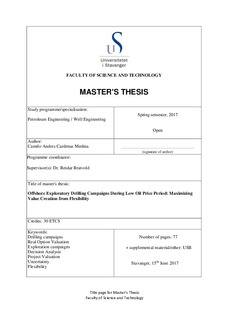| dc.contributor.advisor | Bratvold, Reidar | |
| dc.contributor.author | Cardenas, Camilo | |
| dc.coverage.spatial | Norway | nb_NO |
| dc.date.accessioned | 2017-11-01T09:40:48Z | |
| dc.date.available | 2017-11-01T09:40:48Z | |
| dc.date.issued | 2017-06-15 | |
| dc.identifier.uri | http://hdl.handle.net/11250/2463371 | |
| dc.description | Master's thesis in Petroleum engineering | nb_NO |
| dc.description.abstract | During severe oil price downturns, many operating companies reduce or eliminate large investments with long time horizons such as exploratory drilling campaigns. This reduction in investments forces rig and drilling services providers to reduce their bids to be competitive. The result of this is lower initial investment in the oil and gas projects. In this research, a valuation approach is implemented to study the impact of this investment reduction on the decision-making process for executing exploratory drilling campaigns during low oil price periods. It is demonstrated that postponing exploration campaigns during low oil price periods does not necessary maximize value creation.
Value creation from investment in low price periods results from the combination of uncertainty and flexibility. The analysis of the value of flexibility (optionality) is usually referred to as Real Options Valuation (ROV). In this work, one of the most versatile approach for valuing options is applied: The Least-Square Monte Carlo Method (LSM). Two uncertainties were considered: oil price and drilling cost. Among the different oil price models, the two-factor stochastic price process developed by Schwartz and Smith (2000) was chosen because of its balance between realism and ease of communication to the managers. Drilling cost is modeled as a Geometric Brownian Motion process. By implementing a delayed correlation between the drilling cost and the oil price, the cost reduction observed in the market is accounted for.
In this research, it is shown how real option valuation can be used to determine the optimal time to start the exploratory drilling campaign. Furthermore, it is demonstrated that by including the correlation between the drilling cost and the oil price, the optimal time to execute the investment is during the year with the lowest expected oil price. The impact of this correlation is studied through the use of sensitivity analyses of the project value with respect to the correlation factor and the parameters in the stochastic price model. It is concluded that considering this correlation leads to more realistic project value estimations, resulting in portfolio decisions that maximize stakeholder value.
The key contribution of this thesis is the use of option valuating methods to demonstrate that value will be created by initiating the exploratory drilling campaigns during low oil price periods. The real option model developed in this research is applicable to all types of exploration projects in the petroleum industry. | nb_NO |
| dc.language.iso | eng | nb_NO |
| dc.publisher | University of Stavanger, Norway | nb_NO |
| dc.relation.ispartofseries | Masteroppgave/UIS-TN-IPT/2017; | |
| dc.subject | petroleumsteknologi | nb_NO |
| dc.subject | petroleum engineering | nb_NO |
| dc.subject | investerings- og beslutningsanalyse | nb_NO |
| dc.subject | drilling campaigns | nb_NO |
| dc.subject | real option valuation | nb_NO |
| dc.subject | exploration campaigns | nb_NO |
| dc.subject | decision analysis | nb_NO |
| dc.subject | project valuation | nb_NO |
| dc.subject | uncertainty | nb_NO |
| dc.subject | flexibility | nb_NO |
| dc.title | Offshore Exploratory Drilling Campaigns During Low Oil Price Period: Maximizing Value Creation from Flexibility | nb_NO |
| dc.type | Master thesis | nb_NO |
